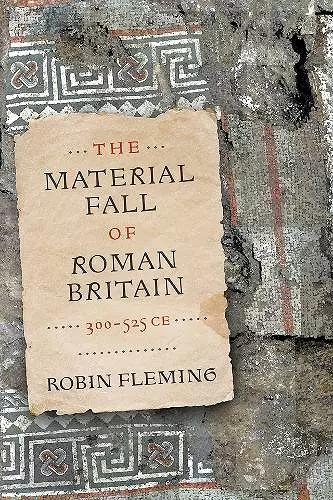The Material Fall of Roman Britain, 300-525 CE
Exploring the transformation of Britain from Roman to early medieval
Format:Hardback
Publisher:University of Pennsylvania Press
Published:11th Jun '21
Should be back in stock very soon

This book examines the collapse of Roman Britain and the emergence of a new cultural identity, blending the contributions of both settlers and indigenous populations.
In The Material Fall of Roman Britain, 300-525 CE, Robin Fleming explores the dramatic transformation of lowland Britain during a pivotal period in history. Following the peak of Roman influence around 300 CE, the region experienced a profound collapse in urban life, economic structures, and state functions by the early 5th century. This decline led to the disappearance of essential skills and crafts that had defined Roman material culture, such as metalworking, pottery production, and stone construction. The loss of these skills marked a significant turning point, resulting in a unique early medieval identity that emerged from the remnants of the Roman world.
Fleming challenges the conventional narrative that attributes the emergence of new material culture solely to Anglo-Saxon settlers. Instead, she presents a compelling argument that both incoming immigrants and the indigenous population of Britain collaboratively constructed a new cultural identity. By analyzing a wealth of archaeological evidence, she reveals how these groups forged a shared material world from the remnants of the old, ultimately shaping the identity that would evolve into what we now recognize as English.
The book emphasizes that this new identity was not simply a product of lineage or ancestry, but rather a historical construct maintained through shared practices and material culture. As The Material Fall of Roman Britain, 300-525 CE illustrates, the collapse of Roman Britain was not just a loss but also a foundation upon which a new society was built, deeply influencing the trajectory of British history.
"[A] readable and thought-provoking volume, which draws not only on a wide range of published works, but also on the wealth of information recorded in 'grey literature' fieldwork reports available on the archaeology data service (ADS). The author is to be congratulated for having spent more time than most engaging with this valuable archive and, it is to be hoped, drawing its existence to the attention of a wider audience. Fleming writes as a historian partly for historians, who are often unaware of how much archaeological evidence exists, but also in an attempt to bridge the other scholarly gap she rightly identifies, between Romanists and early medievalists. She also focuses on the lives of ordinary people instead of the warlords and saints of the written sources, which still colour popular perception of this period…[A]n interesting and stimulating book that provides an account of the unravelling of Roman Britain, clearly linked to the lives of those who experienced it." (Antiquity) "This book marks a crucial step forward in understanding how to look at the massive changes wrought during the fifth century AD in the archaeology of what had been the areas of Britain under Roman rule, and consequently in understanding what was going on and why...This book is a very substantial achievement and will become a standard resource for ideas and information at all academic levels." (Plekos) "Robin Fleming here provides an engaging and thought-provoking account of the end of Roman Britain and its immediate aftermath. The focus is on particular categories of material culture and their socio-economic context...[A]n extremely welcome addition to scholarly discourse, and is one that will be accessible also to students and the informed public." (Medieval Archaeology) "What The Material Fall achieves is to present a new (and in places speculative) vision of Britain between the fourth and sixth centuries. It is fluently written and founded on a detailed understanding of a wide range of diverse evidence...[I]t offers new approaches that sidestep the tired and probably unresolvable discussions of continuity, discontinuity, and ethnicity. This is no mean achievement. These new approaches are desperately needed by a field of research that finds itself in a state of tension over its own identity. What the future holds, and which approach, or approaches, will shape research over the coming decades remains unclear. It's an exciting time to work on Late Antiquity and the transition from Late Roman to Early Medieval." (American Journal of Archaeology) "Fleming's approach to this era of significant change in British history is a refreshing take on the transitional period at the end of Roman Britain and the beginning of Saxon settlement...The work is a welcome addition to existing literature, operating as a happy medium between text-based analysis of material culture and the more analytical texts often devoted to individual elements of material culture. Overall, the book is an enjoyable and thought-provoking read." (The Classical Review) "Robin Fleming uses evidence from archaeology to reassess the transition from the Roman to early medieval period in England. Critiquing previous approaches that have relied too heavily on written texts of later date, Fleming places emphasis instead on the changes in material conditions that impacted on the lives of ordinary people. This is an original and refreshing approach that has not previously been attempted on this scale. The Material Fall of Roman Britain, 300-525 CE is an extremely important and well-written book, and one that deserves a very broad readership." (Martin Millett, University of Cambridge)
ISBN: 9780812252446
Dimensions: unknown
Weight: unknown
320 pages